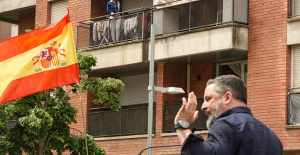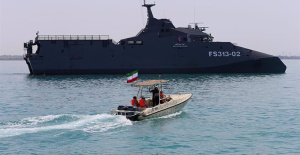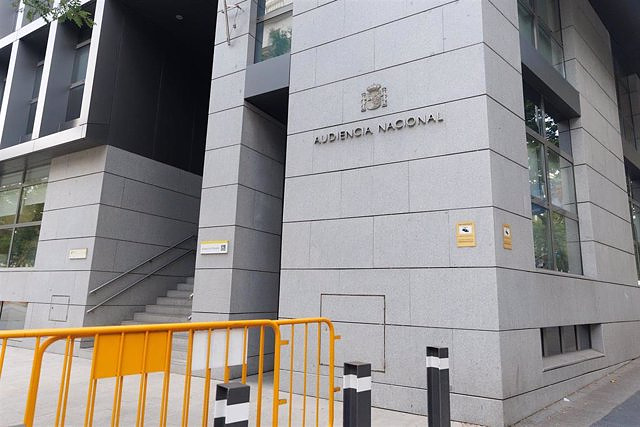Warns that, if this has not been done, the National Court would have violated EU Law
MADRID, 8 Nov. (EUROPA PRESS) -
Josep Lluis Alay, the head of the office of the former Catalan president Carles Puigdemont, has asked the judge of the National Court Manuel García Castellón, who is investigating the altercations caused by Tsunami Democràtic after the 'procés' ruling, to prove that the French citizen who died in the midst of these riots has been treated as a victim of terrorism, in accordance with European regulations.
This is how his defense, carried out by lawyer Gonzalo Boye, is expressed in a writing, to which Europa Press has had access, where he refers to the death due to "fatal heart disease" of a French citizen at the El Prat airport (Barcelona) in the framework of the protests led by the independence platform, an event that the head of the Central Court of Instruction Number 6 includes in the order in which he accuses Alay, points to Puigdemont and points to terrorism crimes.
The defense demands that García Castellón provide them with a copy of all the procedures that have been carried out to comply with article 26 of Directive 2017/541 of the European Parliament and the Council, relating to the fight against terrorism, which includes the "rights of victims of terrorism residing in another Member State".
Alay adds that, "in case of not having acted in accordance with EU Law", "we proceed as a matter of urgency to fulfill said obligation"; "the serious situation of non-compliance that this court would have incurred" is "immediately brought to the attention" of the French authorities; and that "all the documentation it has regarding whether that State activated any mechanism to consider the deceased as a victim of terrorism" be collected from France.
For the defense, "it is unimaginable to think that when more than four years have passed since the events that were supposedly being investigated as a crime of terrorism, no action had been taken in accordance with EU law."
"Said more clearly, there cannot be a procedure for an alleged crime of terrorism in which, in addition, those events are linked to the death of a person and that, at the same time, have not been fulfilled, in more than four years, with what is provided for in the already cited article 26, which establishes state obligations, but which fall on this instructor, with respect to an alleged victim" of terrorism, he clarifies.
However, he expresses his surprise at the fact that such consideration could have been given to the deceased in El Prat. "We do not know since when the Penal Code or Directive (EU) 2017/541 (...) define fatal heart disease as having a terrorist etiology," he says.

 Exploring Cardano: Inner Workings and Advantages of this Cryptocurrency
Exploring Cardano: Inner Workings and Advantages of this Cryptocurrency Seville.- Economy.- Innova.- STSA inaugurates its new painting and sealing hangar in San Pablo, for 18 million
Seville.- Economy.- Innova.- STSA inaugurates its new painting and sealing hangar in San Pablo, for 18 million Innova.- More than 300 volunteers join the Andalucía Compromiso Digital network in one month to facilitate access to ICT
Innova.- More than 300 volunteers join the Andalucía Compromiso Digital network in one month to facilitate access to ICT Innova.-AMP.- Ayesa acquires 51% of Sadiel, which will create new technological engineering products and expand markets
Innova.-AMP.- Ayesa acquires 51% of Sadiel, which will create new technological engineering products and expand markets Cerdán censures the "dirty war" of the right and calls for a debate around "democratic regeneration"
Cerdán censures the "dirty war" of the right and calls for a debate around "democratic regeneration" 12M.- Abascal (Vox) proposes "massive deportations" in the face of illegal immigration
12M.- Abascal (Vox) proposes "massive deportations" in the face of illegal immigration The campaign reaches the halfway mark marked by Sánchez's reflection and with Illa first in polls
The campaign reaches the halfway mark marked by Sánchez's reflection and with Illa first in polls Iran sends 'Shahid Mahdawi' beyond the equator in first long-distance mission by a warship
Iran sends 'Shahid Mahdawi' beyond the equator in first long-distance mission by a warship How Blockchain in being used to shape the future
How Blockchain in being used to shape the future Not just BTC and ETH: Here Are Some More Interesting Coins Worth Focusing on
Not just BTC and ETH: Here Are Some More Interesting Coins Worth Focusing on A sensor system obtains the fingerprint of essential oils and detects if they have been adulterated
A sensor system obtains the fingerprint of essential oils and detects if they have been adulterated Faraday UPV presents the 'Origin' rocket to exceed 10 km of flight: "It is the beginning of the journey to space"
Faraday UPV presents the 'Origin' rocket to exceed 10 km of flight: "It is the beginning of the journey to space" The Generalitat calls for aid worth 4 million to promote innovation projects in municipalities
The Generalitat calls for aid worth 4 million to promote innovation projects in municipalities UPV students design an app that helps improve the ventilation of homes in the face of high temperatures
UPV students design an app that helps improve the ventilation of homes in the face of high temperatures A million people demonstrate in France against Macron's pension reform
A million people demonstrate in France against Macron's pension reform Russia launches several missiles against "critical infrastructure" in the city of Zaporizhia
Russia launches several missiles against "critical infrastructure" in the city of Zaporizhia A "procession" remembers the dead of the Calabria shipwreck as bodies continue to wash up on the shore
A "procession" remembers the dead of the Calabria shipwreck as bodies continue to wash up on the shore Prison sentences handed down for three prominent Hong Kong pro-democracy activists
Prison sentences handed down for three prominent Hong Kong pro-democracy activists ETH continues to leave trading platforms, Ethereum balance on exchanges lowest in 3 years
ETH continues to leave trading platforms, Ethereum balance on exchanges lowest in 3 years Investors invest $450 million in Consensys, Ethereum incubator now valued at $7 billion
Investors invest $450 million in Consensys, Ethereum incubator now valued at $7 billion Alchemy Integrates Ethereum L2 Product Starknet to Enhance Web3 Scalability at a Price 100x Lower Than L1 Fees
Alchemy Integrates Ethereum L2 Product Starknet to Enhance Web3 Scalability at a Price 100x Lower Than L1 Fees Mining Report: Bitcoin's Electricity Consumption Declines by 25% in Q1 2022
Mining Report: Bitcoin's Electricity Consumption Declines by 25% in Q1 2022 Oil-to-Bitcoin Mining Firm Crusoe Energy Systems Raised $505 Million
Oil-to-Bitcoin Mining Firm Crusoe Energy Systems Raised $505 Million Microbt reveals the latest Bitcoin mining rigs -- Machines produce up to 126 TH/s with custom 5nm chip design
Microbt reveals the latest Bitcoin mining rigs -- Machines produce up to 126 TH/s with custom 5nm chip design Bitcoin's Mining Difficulty Hits a Lifetime High, With More Than 90% of BTC Supply Issued
Bitcoin's Mining Difficulty Hits a Lifetime High, With More Than 90% of BTC Supply Issued The Biggest Movers are Near, EOS, and RUNE during Friday's Selloff
The Biggest Movers are Near, EOS, and RUNE during Friday's Selloff Global Markets Spooked by a Hawkish Fed and Covid, Stocks and Crypto Gain After Musk Buys Twitter
Global Markets Spooked by a Hawkish Fed and Covid, Stocks and Crypto Gain After Musk Buys Twitter Bitso to offset carbon emissions from the Trading Platform's ERC20, ETH, and BTC Transactions
Bitso to offset carbon emissions from the Trading Platform's ERC20, ETH, and BTC Transactions Draftkings Announces 2022 College Hoops NFT Selection for March Madness
Draftkings Announces 2022 College Hoops NFT Selection for March Madness























